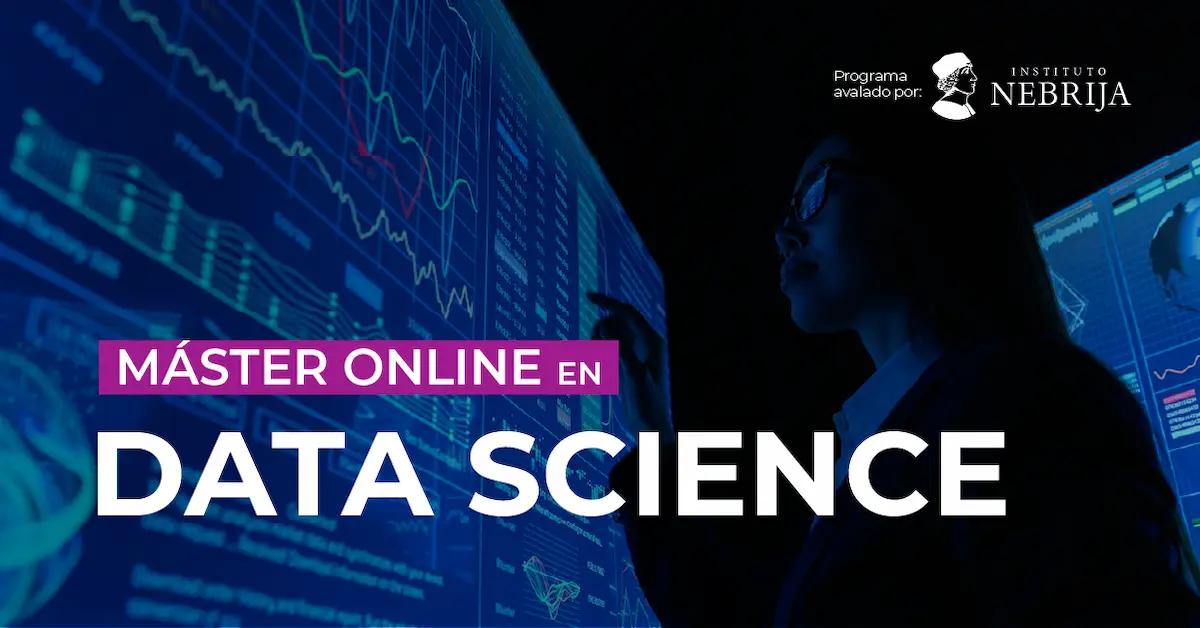In a world dominated by information Data Science has emerged as one of the most relevant and in-demand disciplines of the 21st century. But, What makes this area so crucial and how can it benefit those seeking to specialise in it? In this article we explore the Data Science landscape, its importance and the impact it can have on a professional's career.
What is Data Science and what is it for?
Data Science, or data science, is an interdisciplinary field that combines statistics, programming and business skills to extract knowledge and generate value from data. It is a tool for understanding patterns, making predictions and making informed decisions based on real data.
For example, in e-commerce, data scientists analyse user behaviour to personalise product recommendations. In healthcare, data is used to predict disease outbreaks or improve treatments. Even in sports, professional teams use data science to optimise the performance of their players. There are no limits to the application of this discipline.
How much does a Data Scientist earn?
The salary of a Data Scientist varies according to location, experience and sector. In general, it is one of the best paid professions in the technological field. In Spain, a junior Data Scientist can earn between 30,000 and 40,000 euros per year70,000 per year, while more senior or specialised profiles can exceed 70,000 euros per year. In international markets, such as the United States, salaries can reach even higher figures, exceeding $100,000 per year in many cases.

What work does a Data Scientist do?
The role of a Data Scientist may vary from company to company and sector to sector, but their tasks typically include:
- Exploratory data analysisIdentify patterns and trends in data sets.
- Building predictive modelsUsing machine learning to predict future behaviours or outcomes.
- Data cleaning and preparationEnsure that data are accurate, complete and ready for analysis.
- Communication of resultsTranslating findings into actionable recommendations through reports and visualisations.
- Process automation: Create solutions that optimise operations through analysis and algorithms.
Key skills for a data scientist
Becoming a data scientist requires a combination of technical and soft skills. Essential technical skills include:
- ProgrammingLanguages such as Python, R and SQL are fundamental for manipulating data.
- Statistics and mathematicsUnderstanding concepts such as distributions, probability and predictive models is crucial.
- Data visualisationTools such as Tableau, Power BI or Matplotlib help to communicate findings effectively.
- Machine LearningDesigning and training predictive models is one of the most challenging and valued tasks.
- Database management: Knowledge of systems such as MySQL, MongoDB or Hadoop is essential for managing large volumes of data.
On the other hand, soft skills such as critical thinking, problem solving and effective communication are equally important. These skills allow the results of the analysis to be interpreted and translated into concrete actions.
Many practitioners opt for specialised programmes, such as the IMMUNE Master's Degree in Data Science Onlinewhich offers comprehensive training with practical projects adapted to the needs of the labour market.
Testimonial: The experience of specialising in Data Science
Maruxa, a digital product designer, shared how Data Science transformed her professional vision:
«Durante mi trabajo como diseñadora, me acercaba frecuentemente a los analistas de datos para entender mejor a los usuarios y optimizar productos digitales. Poco a poco me di cuenta de que no quería depender solo de la intuición, sino adquirir las habilidades necesarias para interpretar esos datos por mi cuenta. Esta decisión me llevó a buscar formación en Data Science.»
He also stressed the importance of an educational experience tailored to their needs:
«Uno de los aspectos que más valoro es la metodología ‘Learning by Doing’. Aunque hay momentos teóricos, la mayor parte del aprendizaje es práctico, lo que me permite aplicar lo aprendido de inmediato. Además, el programa está diseñado para quienes trabajamos y necesitamos conciliar diferentes responsabilidades.»
This practical and personalised approach was key to Maruxa feeling supported and able to redirect her career towards data analysis.
How to start a career in Data Science?
If you are considering entering the world of Data Science, here are some key steps:
- Understands the basicsGet familiar with concepts in statistics, data analysis and programming in languages such as Python or R. There are many free and paid resources available online.
- Gain practical experienceLook for courses or programmes that integrate real-world projects. Practice is essential for developing skills and tackling real-world problems.
- Build your portfolioParticipate in data challenges and projects that demonstrate your skills. Platforms such as Kaggle are excellent to get you started.
- Connect with the communityData Science networking can open doors and keep you up to date with industry trends. Participate in events, conferences and meetups.
- Specialise according to your interestData Science has many areas of application, ranging from data analysis to the development of data science models. machine learning. Find the branch you are most passionate about.
Benefits of a career in Data Science
Data Science offers not only high employability, but also a diversity of career opportunities. Some of the career opportunities include:
- Data Analyst: Responsible for interpreting data and generating reports.
- Data ScientistDesign predictive models and analyse complex patterns.
- Data EngineerBuilds and optimises data infrastructures.
- Data ConsultantHelps companies to make strategic decisions based on data.
Moreover, salaries in this field are highly competitive, and the demand for professionals continues to grow.
The international appeal of Data Scientists trained in Spain
The European job market for data science professionals is booming. With accelerating digitisation and the growing importance of data in strategic decision-making, the demand for data analytics and data management experts far outstrips the available supply. In this context, Many European countries are focusing their efforts on attracting foreign talent, especially from Spain, thanks to the quality of training and practical skills that Spanish professionals acquire during their academic preparation.
The reputation of Data Science training in Spain
Spain has developed a robust educational ecosystem in the field of Data Science, combining a solid theoretical base with practical programmes focused on solving real problems in the sector. Master's degrees such as IMMUNE destacan por su metodología «Learning by Doing,» que asegura que los estudiantes no solo adquieran conocimientos, sino que también desarrollen la capacidad de aplicarlos en entornos reales. This makes graduates attractive candidates for employers throughout Europe.
Countries such as Germany, the Netherlands and the United Kingdom actively seek Spanish professionals due to their ability to adapt quickly to multicultural work contexts and their focus on collaborative work. In addition, fluency in several languages, including English, adds a differential value to profiles trained in Spain.
High demand in key European markets
- Germany: With a highly advanced industrial and technological sector, Germany needs Big Data and Machine Learning specialists to optimise processes and develop new technologies.
- United Kingdom: Despite Brexit, London remains a global financial centre with a demand for data analysts to strengthen areas such as banking, retail and fintech.
- Scandinavian countries: Sweden, Denmark and Norway are leading the way in sustainability and green technology, and need data science experts to manage data related to renewable energy and environmental impact projects.
- France: With Paris as a technology hub, luxury, automotive and digital services companies are constantly looking for talent to improve their data-driven strategies.
The benefits for Spanish Data Scientists
Working abroad offers multiple benefits, from more competitive salaries to the possibility of gaining experience in projects of greater scale and global impact. In addition, international mobility allows Spanish professionals to establish broad and diversified networks of contacts, which is essential in such a dynamic field as Data Science.
The training received in quality programmes in Spain, such as the IMMUNE Master's Degree in Data Science Onlineis an open door to international opportunities, positioning graduates as key players in a constantly evolving European labour market. This not only enriches their professional experience, but also contributes to the recognition of educational excellence in Spain.
A sector with infinite possibilities
Data Science is not only a career with high employability rates, but also a powerful tool for transforming industries. By specialising in this field, you not only expand your career opportunities, but also develop a critical and strategic vision that can take you to the next professional level.
If you are interested in taking this leap, take the time to research and choose a training that suits your needs and goals. As Maruxa's experience shows, having the right support can help you make the right choice. making a difference on the road to success in the world of Data Science. Whether you are looking to improve your current skills or change careers, Data Science has a place for you.

